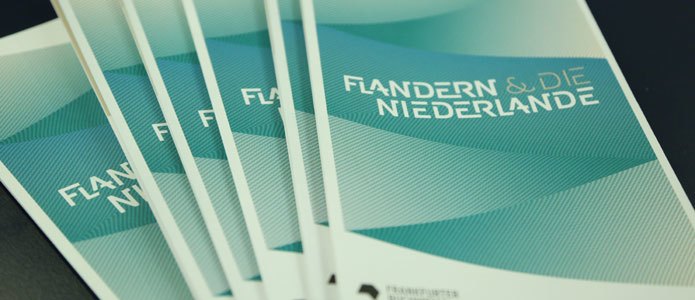Flanders and the Netherlands are guests of honour at the 2016 Frankfurt Book Fair and aim to set new standards by highlighting the book as the linchpin of the creative industry.
When Flanders and the Netherlands, a common language area, were guests of honour for the first time at the 1993 Frankfurt Book Fair the objective was to capture the German book market for the great Flemish and Dutch authors. And sure enough, writers like Cees Nooteboom and Harry Mulish, who died in 2010, were not only embraced by the newspaper culture sections as a result, their novels also featured regularly on bestseller lists. Twenty years later, Dutch authors need no special introduction to the German book market anymore. Meantime, writers like Jessica Durlacher, Herman Koch, Leon de Winter, A.F. Th. van der Heijden, Connie Palmen, Arnon Grünberg, Maarten ‘t Hart and many others are among German readers’ favourites.
Under the heading “This is what we share” the year 2016 provides an opportunity to discover anew a literature that is definitely not national. It is certainly worth taking this second look at the apparently familiar and close, especially as the Book Fair guests have come up with a very particular novelty. The artistic director of the fair presence of Flanders and the Netherlands, selected by the umbrella organisations, the Nederlands Letterenfonds and the Vlaams Fonds voor de Letteren, is Bart Moeyaert, the author of successful books for children and young people. What is more, his programme also has new focal points. It is deliberately modern and not folkloristic, and it seeks a way to bracket the Netherlands and Flanders that extends beyond the common language. It has also forged a link to Germany: “I wanted to speak about what we share,” says Moeyaert. “The sea, the North Sea, is shared by Belgium, the Netherlands and Germany. But of course just having the North See as a theme would not be meaningful because it is a touristic image. However, I find the sea as a literary image wonderful, as the sea is both poetic and political. What is more, if we think of refugees, the sea is also not always calm and beautiful.”
Addressing minds and hearts
The resulting programme, compiled with Bas Pauw as overall project director, Judith Uyterlinde as coordinator of the literary programme and Bart Moeyaert, is intended to offer more than illustrated facts. Stories will be told, many tiny details will converge into a colourful patchwork rug made up of images, visions and ideas about life in our present day and addressing both minds and hearts. The extensive programme for Frankfurt involves 70 writers from all genres. It will take place partly on the fair grounds, in a pavillion that will also accommodate complex virtual-reality presentations. Additionally, Frankfurt’s theatres and museums will host famous and less famous names in the fields of contemporary art, dance and drama from Flanders and the Netherlands.
So the Book Fair in Frankfurt is just one component of the guests’ overall presence. The programme will be complemented by readings, performances and festivals in several German cities, including Münster, Munich, Leipzig and Berlin. Thanks to cooperation with lit-cologne, for example, the programme began in spring already. What is more, it will extend well into autumn, to include the Hamburg Harbour Front Festival, an exhibition on Dutch Avant-Garde Art after 1945 in Karlsruhe and the Youth Theatre Weekend in Mainz. All in all, about 400 events will take place throughout Germany within the framework of this programme.
A supposedly small literary region
The increasingly important economic significance will also not be neglected in Frankfurt. The figures alone indicate the value of this supposedly small literary region for the German book market: 376 new titles from Flanders and the Netherlands in all genres will be published in 2016, including 230 new translations. And 132 German literature publishers will have a Dutch-language book on their 2016 lists. Germany is by far the most important export country for this literary region – and German translations are often the springboard for other language areas. According to project manager Bas Pauw, “never before have so many titles been newly translated into German in one year”.
The presence of Flanders and the Netherlands as honorary guests will set new standards in other respects too, given that the concept clearly extends beyond the Book Fair. Authors and literary agents will be networked sustainably with the help of literary foundations and the Goethe Institutes. Since 2015, 31 German translators have worked in the Translator Houses in Antwerp and Amsterdam, twelve German authors have been guests in the Literature Houses in Brussels and Amsterdam, eleven Flemish and Dutch authors in Berlin. At the invitation of the Goethe Institute, Kaathrin Passig and Annett Gröschner lived for a month as writers-in-residence in Rotterdam, for example. The Dutch literary magazine
Das Mag was also published for the first time in a unique German edition with the support of the Goethe Institute in Amsterdam.
So the venerable and also very lively medium of the book is being highlighted as the powerhouse of a constantly changing creative industry. It is being flanked by the numerous revolutionary innovations of the past years by means of which the book industry worldwide has been turned upside down by new technologies, new forms of writing, a variety of digital and analogue publication possibilities, or, to quote Bart Moeyaert: “New names, new people, a new dynamism! It is like the sea, everything is in motion and there are treasures on the shore.”
